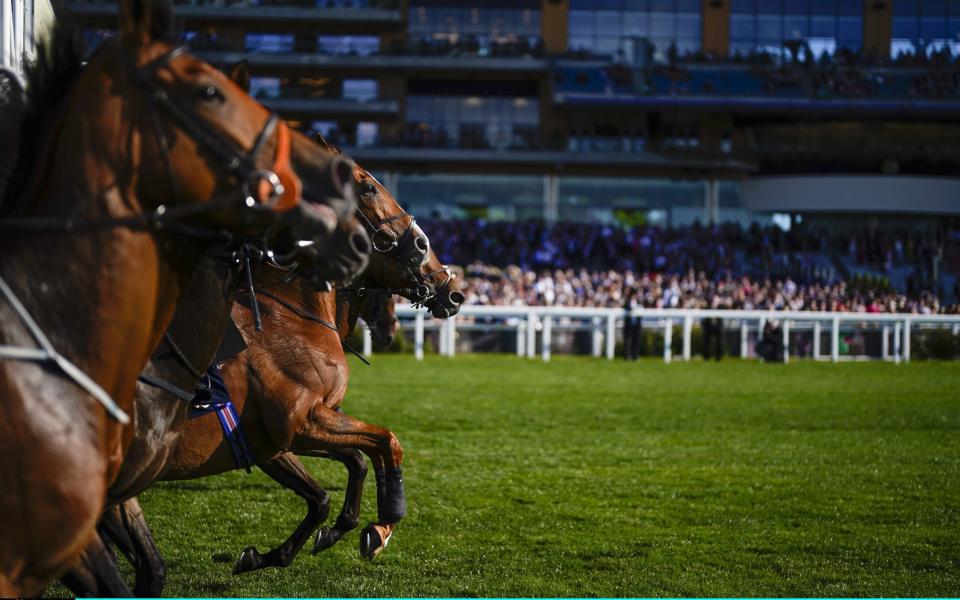Racehorses ‘killed for human consumption’ in alleged passport fraud and smuggling operation

An investigation has been launched into what appears to be an EU-wide horse passport fraud and smuggling operation after hidden cameras captured Irish race horses being killed for human consumption.
An hour-long documentary by Irish broadcaster RTE titled ‘Horses: making a killing’ aired on Wednesday night and contained graphic scenes, taken by a secret cameras, of horses slipping over, collapsing and being beaten with alkathene pipes in an unlicensed barn at Ireland’s last remaining licenced equine abattoir in Straffan, County Kildare.
Footage also appeared to show one man putting new microchips in horses’ necks to change their identity, presumably to ‘clean’ them up for human consumption in Europe.
The investigation, an expose into what happens when horses and ponies are no longer useful and too expensive to keep, claimed that of the 2,000 horse that went through the abattoir, run by Shannonside Foods, between January 2023 and March this year, “the majority were thoroughbreds who have raced more than 3,000 times between them”.
Horse Racing Ireland have said they will assist investigations, including any launched by Garda or the Department of Agriculture, while the British Horseracing Authority and World Horse Welfare have reiterated their call for the government to introduce a digital-only identity system for horses.
HRI added it did not have the data to confirm the programme’s figures.
France, where there are still butchers specialising in horsemeat, imports 2,500 tons of horsemeat a year and said that 400 tons of it comes from Ireland. It is illegal, however, for any racehorses treated with the painkiller Bute – like most humans with a Nurofen, nearly all racehorses will have been given Bute at some stage of their career – to enter the food chain.
A statement from HRI said it was “deeply shocked and appalled” by the content of the RTE Investigates documentary.
“The criminal behaviour depicted in the documentary is disgusting and is not the experience of the vast majority of the 30,000 people who make their livelihood in the horse racing and breeding industry in Ireland,” the statement read. “HRI has zero tolerance for mistreatment of horses in any circumstances and criminal and regulatory sanction must be imposed on anyone found to have behaved in an illegal way towards horses.”
It added: “Equine safety and care is HRI’s top priority and this year HRI will invest €16.1 million (£13.58 million) in welfare and integrity services. The thoroughbred horse is enshrined in Irish and EU law. Significant legal and regulatory checks and balances are in place for thoroughbred horses from birth through their racing career and life cycle. HRI will review the issues in the RTE documentary and will actively support any Department of Agricultural or Garda investigation and urge anyone with information about the mistreatment of horses to report it.”
In Britain a similar investigation was carried out by Panorama called the ‘Dark side of Horse Racing’ in 2021.
The BHA brought in a rule in 2022 which means every racehorse should be immediately signed out of the food chain with a stamp in its passport when it is first entered to run.
The system is not 100 per cent failsafe because paper passports are not tamper-proof thus the call for digital passports, which would make it even harder for anyone to forge a horse’s identity. That rule is not reciprocated in Ireland and Irish-trained horses running in the UK are not signed out.
If the only option for an ex-racehorse is to have it put down, then the BHA’s code of practice recommends it being done at home by a vet and then removed, often incinerated. It may incur a cost of around £500.
In 2023, 88 thoroughbreds went through British abattoirs based on records of passports returned to Weatherbys although the BHA is awaiting further information from the Foods Standards Agency. Of those 84 were from abroad (mainly Ireland) and of the four British thoroughbreds only one had raced in the last four years and that was prior to 2022.
Last month the government passed the Animal Welfare (Livestock Exports) Act which will, when it is introduced in the next parliament, make the transport of live animals abroad for slaughter illegal which should, at least, make it harder for animals to pass through Britain on their way to the continent which is the case now.
Roly Owers, chief executive of World Horse Welfare, said: “What we witnessed last night was outrageous and proof that, well over a decade on, the dark underside of the horse meat scandal never truly ended. The documentary once again lifted the lid on the dark underside of the horse trade and the suffering it causes. These horses were let down in every way possible by an inherently flawed system and we hope that the disgust generated by the programme, alongside food safety concerns, will be channelled into practical action by EU and UK authorities.
“We desperately need a robust equine digital identification system, accessible across the EU, EEA and Britain. There is no excuse for allowing this fraudulent trade to continue and we hope that authorities will recognise the damage it causes and put in the right measures to stop it. We also need the abhorrent and illegal practices that we endured during last night’s programme at the slaughterhouse to be stamped out immediately. Those involved need to be made to answer for their actions and face significant consequences.”
Horse meat, however, is just a part of a far bigger problem according to Chris Elliott, a professor of food safety, who was interviewed for the programme. “There is more money,” he explained, “in food fraud than the heroin trade worldwide.”
Shannonside Foods Ltd said any allegation of an equine being mistreated “will be fully investigated by the company”.

 Yahoo Sport
Yahoo Sport 






































